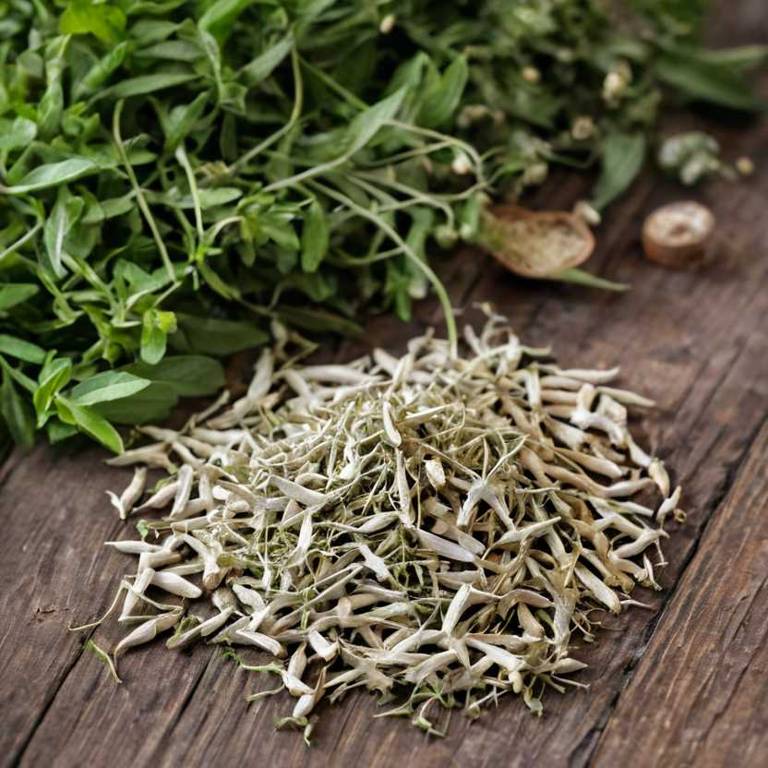By Leen Randell
Updated: Jul 05, 2024
What Are The Medicinal Properties Of Withania Somnifera (Ashwagandha)?

Withania somnifera, also known as ashwagandha, has health benefits such as reducing stress and anxiety, improving sleep quality, and boosting immunity.
The medicinal constituents of ashwagandha include withanolides, alkaloids, and saponins, which are responsible for its therapeutic properties. Ashwagandha is commonly used in medicinal preparations such as capsules, tablets, and decoctions. Potential side effects of ashwagandha use may include stomach upset, diarrhea, and allergic reactions.
To avoid interactions and side effects, it is essential to consult with a healthcare professional before adding ashwagandha to your regimen.
This article explains the health benefits, active constituents, medicinal preparations, possible side effects, and precautions related to Withania somnifera.
- What are the health benefits of Withania somnifera?
- What are the active constituents of Withania somnifera?
- What are the medicinal preparations of Withania somnifera?
- What are the possible side effect of using Withania somnifera improperly?
- What precautions to take when using Withania somnifera medicinally?
What are the health benefits of Withania somnifera?
Withania somnifera, also known as ashwagandha, has health benefits such as reducing stress and anxiety, improving cognitive function and memory, and boosting the immune system.
Its adaptogenic properties help balance the body's hormonal responses, making it a natural remedy for conditions like insomnia, fatigue, and hypertension.
Ashwagandha also has anti-inflammatory and antioxidant effects, which can help protect against chronic diseases such as heart disease and cancer.
Here's a detailed article about the 10 health benefits of Withania somnifera.
What are the active constituents of Withania somnifera?
Withania somnifera, also known as ashwagandha, has active constituents such as withanolides, alkaloids, saponins, and flavonoids.
These constituents are primarily responsible for its medicinal properties, including anti-inflammatory, antioxidant, and immunomodulatory effects. Withanolides, in particular, have been shown to possess significant neuroprotective and cardioprotective properties, while alkaloids have been found to exhibit anticonvulsant and anxiolytic activities.
The unique combination of these constituents contributes to ashwagandha's therapeutic potential.
Here's a detailed article about the 10 active constituents of Withania somnifera.
What are the medicinal preparations of Withania somnifera?
Withania somnifera, also known as ashwagandha, has medicinal preparations such as churnas, powders, capsules, and tablets that are commonly used in Ayurvedic medicine.
These preparations often combine ashwagandha root with other herbs like shankhpushpi and brahmi, and are used to alleviate stress, anxiety, and fatigue, as well as to enhance cognitive function and improve sleep quality.
The standard dosage of ashwagandha ranges from 300mg to 1200mg per day.
Here's a detailed article about the 10 medicinal preparations of Withania somnifera.
What are the possible side effect of using Withania somnifera improperly?
Improper use of Withania somnifera, also known as ashwagandha, increases the chances of experiencing side effects such as nausea, vomiting, diarrhea, stomach upset, and headaches.
High doses can also cause thyroid problems, insomnia, and anxiety in some individuals, while pregnant women may experience uterine contractions and reduced fetal growth.
Long-term use can lead to dependence and withdrawal symptoms upon cessation.
Here's a detailed article about the 10 most common side effects of Withania somnifera.
What precautions to take when using Withania somnifera medicinally?
Before using Withania somnifera, also known as ashwagandha, for medicinal purposes, you must take precautions such as consulting with a healthcare professional, especially if you have a pre-existing medical condition or are taking medications, as ashwagandha can interact with certain drugs.
Additionally, pregnant or breastfeeding women should use caution, as high doses may stimulate uterine contractions or affect milk production.
Also, monitor blood sugar levels, as ashwagandha may lower them.
Here's a detailed article about 10 precautions to take when using Withania somnifera.